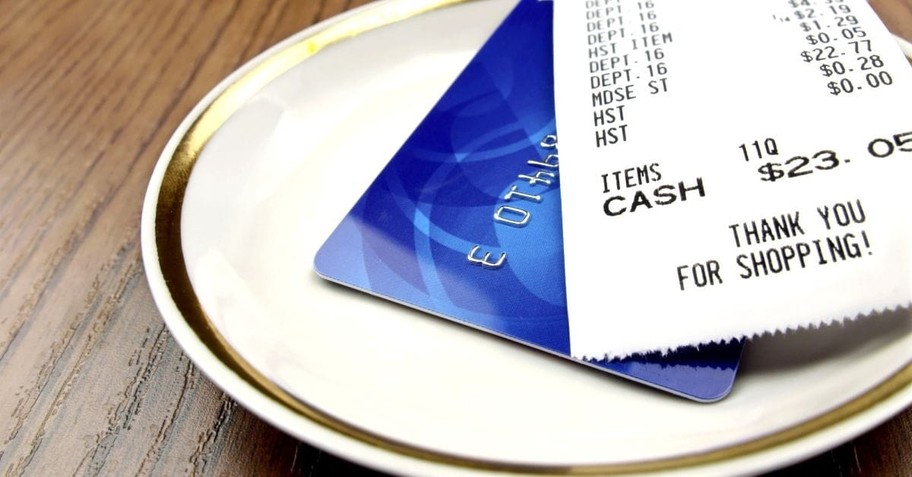6 Easy Budget Tips That Can Cut Couples’ Spending in Half

Jesse and I have been on a mission for the last couple of years to be completely debt-free by the time we are 33.
We were following the Dave Ramsey method for quite a long time, but as life got more busy, we became far too relaxed with our spending money and weren’t being as wise as we should have been with our finances. We were ready to start fresh!
I recently shared on my Instagram Stories that the amount of money we were spending (specifically on food) literally made me sick to my stomach.
I honestly avoided looking over my bank statements for a while because I knew how reckless we were being with our money, but once we finally did, it was a huge eye-opener. Over the past two months, we have implemented these six tips listed below. And in less than 60 days, we have cut our spending money completely in half!
It has been such a huge blessing to us (and to our savings accounts.) Although it takes self-discipline, we feel so much better that we are putting away so much more for our family.
Here are six tips to help you cut your spending money in half:

1. Evaluate your monthly expenses.
First and foremost, it’s important to find out where your money is going. I strongly believe that it is crucial to do this together as husband and wife.
To be successful, you both need to be on the same page regarding your budget. Otherwise, it will likely cause frustration and the person attempting to keep the budget will eventually give up. (We’ve been there!)
Jesse and I planned an evening to sit down together. We printed out the past three months of bank statements to get a general idea of our spending and separated each expenditure into a category:
Fixed Bills
Manageable Bills
Generous Gifts & Tithing
Eating Out
Groceries
Miscellaneous Spending
Fixed bills are, of course, the bills that you can’t change (unless you sell a house or a car which definitely should be considered if necessary.) Everything else on the list can be adjusted.
We added up each category and calculated the percentage for each. The amount we spent on eating out was TWENTY-FIVE PERCENT of our monthly income. (Be right back while I go and cry in a corner!)
You guys, that doesn’t even include groceries! I knew we had to make a change and quickly.
We wrote down the amounts what we were currently spending next to what we wanted to spend for the next month – which was about 50% less.
Photo Credit: ©Thinkstock/Andrey Popov

2. Use Cash App cards.
A friend shared this idea with me and it has been life-changing for us and by far the most helpful when it comes to saving money! P.S. This is not at all sponsored. I just love it!
Cash App is a free app used to send and receive money. They give free, reloadable cash cards which they’ll mail directly to you. They can be used anywhere and reloaded at any time.
We have it set up so that Cash App automatically adds our spending limit to each card on the 1st of every month. We cut our spending money by over $700 per month.
We have committed to one another that we will not use our regular debit card to purchase anything that isn’t a necessity or discussed beforehand. Basically, if it isn’t in our budget, we don’t buy it on the debit/credit card.
However, the money spent on our cash card is completely free reign UNTIL it runs out. We do not add any additional money!
Just by doing this, we’ve cut our spending money by 35%!
Photo Credit: ©Thinkstock

3. For my coffee lovers.
Jesse is a self-proclaimed coffee addict. He’s a real estate agent, so he’s on the road a lot. He gets a coffee as a treat for himself almost daily and I like to get one occasionally.
But as we went through our expenditures, we found that together we were spending over $200 a month on coffee. Ah!
We decided to purchase this Cold Brew Coffee Maker which was under $30 so that we had iced coffee on hand every morning. We also use this insulated coffee tumbler with a straw to keep it cold throughout the day.
By making our own coffee at home, we have cut our spending money down another $170 per month and saved $340 in two months.
The Coffee Recipe That Replaced Our Starbucks Addiction
Photo Credit: ©Pexels/Burst

4. Budget every single dollar.
I use the EveryDollar app to create our budget every month. It does exactly what it says – it budgets every single dollar of your income so that there is absolutely no room for waste or impulsive spending.
Meal planning and setting our grocery budget each month has helped tremendously. It also helps us to be even more intentional with our generous giving and tithes so that we are able to give a higher percentage each month to people in need.
Photo Credit: ©Thinkstock

5. Cancel your insurance and use a Christian Healthcare Share Plan instead.
To clarify, this one we have been doing for longer than two months. So far, it has saved us $350 a month on insurance totaling $4,200. We are self-employed, so this is a good fit for us.
If you have good insurance with your own company and pay less than $495 a month for your family, you can disregard this part!
We personally use Samaritan’s Ministries but there are a lot of different options like Christian Ministries, Medi-Share, etc.
For us, the pros have outweighed the cons by far. We really love Samaritan’s and how much it has benefitted our family.
Below I’ve listed some of our personal pros and cons.
Photo Credit: ©Thinkstock

Pros and cons of our Share Plan:
Pros:
We save $350 per month on insurance.
The staff are helpful, kind and they even pray with us before we hang up the phone. I cried the first time!
They cover up to $250,000 per incident without any deductible.
Our monthly share ($495) is sent directly to a member with a medical need which gives total transparency about where the money goes and what its needed for.
The family plan is $495 – no matter how many children you have, if any. You can choose a cheaper, more basic plan as well.
You can see any doctor you want without any worry about out-of-network expenses.
Special Prayer Needs help to cover pre-existing conditions. For example, we paid an inordinate amount of money out-of-pocket for Saxon’s delivery – even while having Obamacare. We shared that as a Special Prayer Need and received half of that payment back as gifts from other members. It wouldn’t have been covered otherwise.
Cons:
You do have to pay up front for most costs. This means that you’ll need to be sure to have some money on hand. Samaritan’s will pay you back in full, however, within 3 months of your visit. We just used our Southwest Airlines Card for Sutton’s ear surgery ear surgery and we got a round-trip flight out of it. Win win.
Visits under $300 are not covered. This was hard when Saxon was a newborn because we had so many appointments. But we have calculated it, and even with all of the boys’ check-ups or sicknesses, we still pay much less annually than we would with regular insurance.
Some pre-existing conditions cannot be covered (see the website for more information on this.)
Immunizations and check-ups are not shareable.
Photo Credit: ©Unsplash/Martin Brosy

6. Cut unnecessary costs.
Small bills add up quickly. There are a lot of things that we were paying for that weren’t necessary. In order to get out of debt, there are sacrifices that we make to get there – which includes getting rid of subscriptions that aren’t completely necessary.
Here are a few suggestions on how to do this:
Call multiple cable companies and compare costs for cable and internet. Request a lower rate from your cable provider based on competitor pricing.
Call your cell phone provider and combine phones on a family plan.
Get rid of your music subscriptions and use the free versions.
Learn how to cut your own dog’s hair rather than going to a groomer.
Set a specific gas budget per month and limit yourself with driving so as to not exceed that limit.
Cancel your own TV subscriptions like Netflix, Hulu and Amazon and share with your family instead.
Remember: You are sacrificing now in order to live more freely in the future.
These changes have saved us over $3,000 in just two months!
Jesse and I strongly believe that we are called to be faithful with the money that God has entrusted us with and we desire to have the ability to use that money for a greater good – rather than just on ourselves.
“Do not lay up for yourselves treasures on earth, where moth and rust destroy and where thieves break in and steal, but lay up for yourselves treasures in heaven, where neither moth nor rust destroys and where thieves do not break in and steal. For where your treasure is, there your heart will be also.” Matthew 6:19-21.
Lindsey Maestas is a lifestyle blogger based in Albuquerque, NM. She has a passion for God, people, food and fashion. She started Sparrows + Lily to openly share the raw & real parts of life with the goal of encouraging others. Hear more about faithful living, motherhood, marriage and womanhood on The Milk and Honey Podcast! We share encouragement and raw vulnerability in 30-minute episodes to help you find a little hope in the messiness of life!
This article originally appeared on sparrowsandlily.com. Reprinted with permission. Connect with Lindsey on Facebook at facebook.com/sparrowsandlily.
Photo Credit: ©Thinkstock
Originally published January 22, 2025.








